Politics
Japan’s ruling party elects Shigeru Ishiba as new prime minister
Published
6 months agoon
By
Ekwutos BlogStory by Michelle Lee, Julia Mio Inuma
Ishiba, 67, on Friday clinched the leadership of the ruling Liberal Democratic Party — on his fifth attempt — and will therefore become the new prime minister. He will succeed Fumio Kishida, who reshaped Japan’s role in the international community but last month announced he would step down amid record-low approval ratings.
The former defense minister will have to contend with pronounced international volatility: The Asia-Pacific region is being reshaped by the rise of China, and the United States might soon reelect Donald Trump, who questioned the value of security allies such as Japan during his first term as president.
Trump’s potential return has many Japanese policymakers and analysts on edge about what it would mean for America’s most important ally in Asia that also depends on Washington for its national security. During Trump’s first term, then-Prime Minister Shinzo Abe forged a close relationship with the U.S. leader through flattery and golf outings. But Abe was assassinated in 2022, and Japan no longer has a similar conduit it can rely on to manage Trump’s personality.
Japan is also grappling with increasing security threats and risk of war in the region, with Russia’s invasion of Ukraine, North Korea’s nuclear ambitions and China’s growing military threats. Just this week, China test-fired an intercontinental ballistic missile into the Pacific Ocean, its first such test in decades. Japan later said it had received no notice of the launch.
While he does not question the importance of Japan’s security alliance with the United States, Ishiba has said Tokyo needs to play a greater role in the alliance and have more say in how American troops are deployed in Japan. He wrote in his 2024 memoir that “Japan is still not a truly independent country” because of the “asymmetry” of Japan’s dependence on America for its security.
His blunt assessment is a break from his predecessor Kishida, who skewed closer to Washington and built deeper relationships with other U.S. allies in the Asia-Pacific region, including South Korea and the Philippines, as a counter to China.
Ishiba, on the other hand, has called for deeper engagement and more diplomacy with China, rather than the vilification of Beijing. He has criticized Kishida’s oft-repeated phrase used to rally like-minded countries against China after the Russian invasion: “Ukraine today may be East Asia tomorrow.”
Ishiba wrote in his memoir that conflating the Russian invasion of Ukraine with a feared Chinese attack on Taiwan is driven by emotion, not a pragmatic assessment of Chinese threats and the impact on Japan.
He is a strong backer of Taiwanese democracy and has proposed creating an “Asian NATO” to counter security threats from China and North Korea.
Analysts say Ishiba has shown his expertise in issues of foreign policy and defense, but the idea of an Asian version of NATO has drawn skepticismfrom many observers in Washington.
“He’s come up with — some would say bold, others would say interesting — ideas about Japan’s security arrangements,” said Shihoko Goto, director of the Indo-Pacific Program at the Wilson Center in Washington. “His idea about collective defense in the region has been particularly noteworthy. How he’s going to accomplish it is another question.”
In recent weeks, Ishiba emerged as one of three front-runners in a crowded race for the premiership, with a record nine candidates in contention.
The nail-biter election consisted of two rounds. In the first round, the party’s 368 members in the national legislature and 368 rank-and-file members cast their ballots. Then in the second runoff round between the top two candidates, 415 votes were cast — 368 from the LDP members in the legislature and one vote from the local LDP chapter in each of Japan’s 47 prefectures.
Ishiba came in second after economic security minister Sanae Takaichi in the first round, but he beat Takaichi in the runoff by 21 votes.
“An LDP with a free and vigorous debate, an LDP that is fair and just, an LDP that is humble: I want to go back to that time again,” Ishiba said after his victory. “We will believe in the people, speak the truth with courage and sincerity, and do everything in our power to make Japan a safe and secure country where everyone can once again smile.”
He will be officially announced as prime minister at a special legislative session on Tuesday.
A majority of Japanese voters say they are eager for new faces and new ideas, according to polls, but the candidates mostly offered more of the same in the world of Japanese politics, where men, people over 50 and hereditary politicians have long called the shots. Only two of the nine candidates for LDP leader were women, only two contenders were under 60, and more than half inherited their fathers’ legislative district seats.
Ishiba will take over as trust in his party and Japanese leadership is at an all-time low because of a string of corruption scandals that plagued Kishida’s tenure.

Japan’s Prime Minister Fumio Kishida wraps up a news conference in Tokyo on Aug. 14, in which he announced that he would not seek reelection.
© Philip Fong/AFP/Getty Images
Addressing the challenges, Ishiba has said the LDP “needs to make a proper explanation to the people” of its decisions, “and that explanation needs to be accepted by the people.”
The veteran politician is known for being a thorn inside the party because he has publicly criticized and opposed its elder statesmen, and was the top choice among LDP supporters who want to see the new leader clean up dirty politics, polls show.
Still, the new leader will face a big challenge to convince the public that the party is headed in a brand new direction, said Shiro Sakaiya, Japanese politics professor at the University of Tokyo’s Graduate Schools for Law and Politics.
“Regardless of who becomes the next leader, I don’t think the issues [with the LDP] will drastically be resolved,” Sakaiya said before the results were out.
Ishiba will also face a challenging economic landscape after Kishida’s lackluster efforts to jump-start the economy: a weakening yen, inflation, growing national debt and wage stagnation.
Mireya Solis, Knight Chair in Japan Studies at the Brookings Institution in Washington, said the new prime minister would have to put forward a convincing economic platform to win back support for the LDP.
“I don’t believe the Japanese public feels that their standards of living are secure and stable and they have a bright future. So I think that they’re paying attention to that,” she said.
The son of a former cabinet minister, Ishiba entered politics after his father’s death. He is open about his Christianity, which is rare among Japanese politicians, who tend to keep their religious views private.
For decades, Ishiba was known to take contrarian views within the LDP — most notably, as a critic of former prime minister Abe, Japan’s longest-serving prime minister and senior statesman in the LDP.
When dozens of LDP lawmakers became embroiled in a political funding scandal, Ishiba suggested Kishida resign to take responsibility — which drew backlash from his fellow colleagues. Kishida eventually did resign in part because of the plummeting public support for his leadership in the aftermath of those scandals.
Polls show he is popular with the public because of his willingness to criticize his party and its elders — but he is largely disliked among his colleagues for the same reason.
A native of Tottori, Japan’s least populated prefecture, he has been a longtime advocate of rural revitalization. He is pledging to stimulate economic growth by creating economic opportunities outside of the overconcentrated capital of Tokyo.
You may like
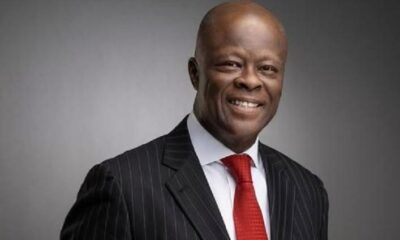

US tariffs won’t have much effect on Nigeria – FG
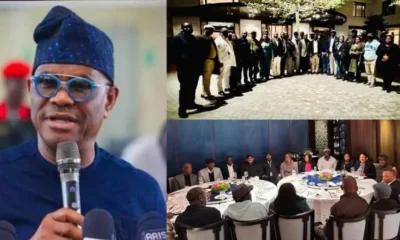

Wike hosts suspended Rivers lawmakers in UK
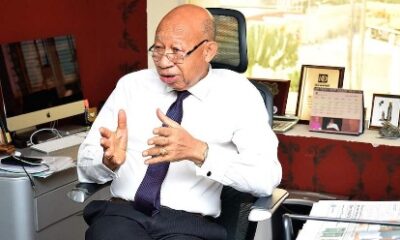

Pascal Dozie, Founder Of Diamond Bank Passes Away At 85
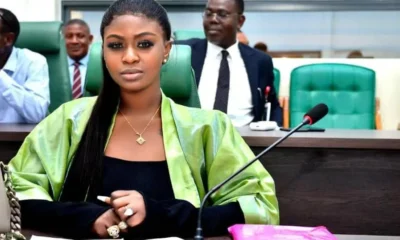

Tuface’s lover Natasha Osawaru replaced as Deputy Leader after shake-up in Edo Assembly
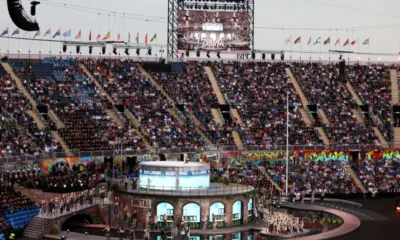

Nigeria seeks to host 2030 Commonwealth Games
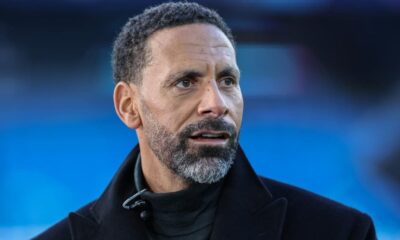

Garnacho has to leave Old Trafford, make way for Osimhen – Rio Ferdinand
Politics
Wike hosts suspended Rivers lawmakers in UK
Published
9 hours agoon
April 8, 2025By
Ekwutos Blog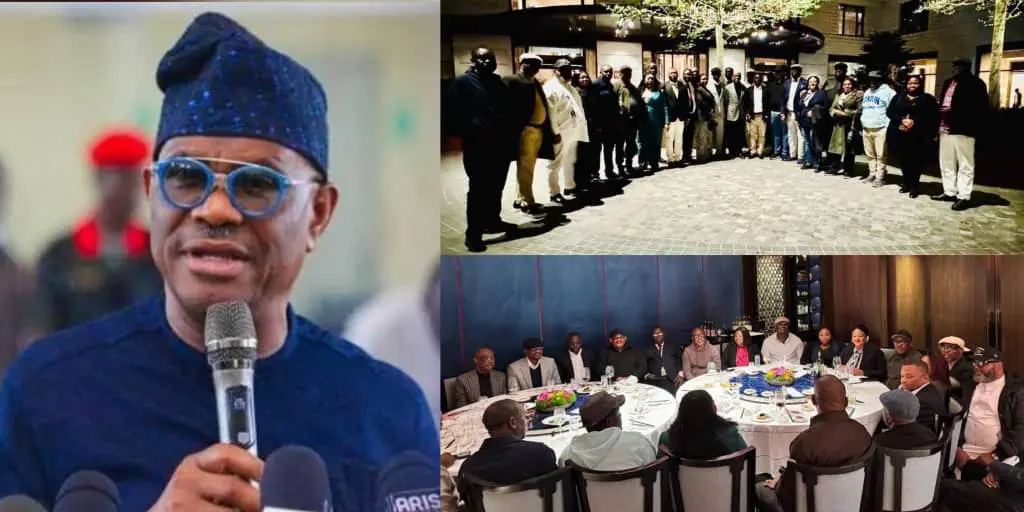
The Minister of the Federal Capital Territory, FCT, Nyesom Wike, on Monday met with the suspended members of the Rivers State House of Assembly.
Wike hosted the suspended lawmakers for a dinner in the United Kingdom, UK.
This followed his earlier meeting with some of his political allies in Port Harcourt, the Rivers State capital, on Sunday.
The meeting was disclosed by the minister’s media aide, Lere Olayinka, via his Facebook page.
According to Olayinka: “Yesterday, the FCT Minister, Nyesom Wike, hosted Rivers State House of Assembly members who are in the United Kingdom for Legislative Capacity Building, to a dinner. Wike left Nigeria on Sunday night after visiting his political friends and associates in Port Harcourt, Rivers State.”
Recall that the lawmakers were suspended by President Bola Tinubu after declaring a state of emergency in Rivers State due to security concerns. Governor Sim Fubara was also suspended for six months. The emergency rule stemmed from the ongoing political crisis between Wike and Fubara.
The crisis had affected the lawmakers and the entire political structure in Rivers State.
The Supreme Court later intervened, ordering the reinstatement of the lawmakers and directing Governor Fubara to present the 2024 budget before the Martins Amaewhule-led Assembly.
However, Fubara’s attempt to present the budget was thwarted as the lawmakers barred him from accessing the Assembly complex.
The suspended lawmakers are currently in the UK for a legislative capacity-building programme.
Politics
Tuface’s lover Natasha Osawaru replaced as Deputy Leader after shake-up in Edo Assembly
Published
17 hours agoon
April 8, 2025By
Ekwutos Blog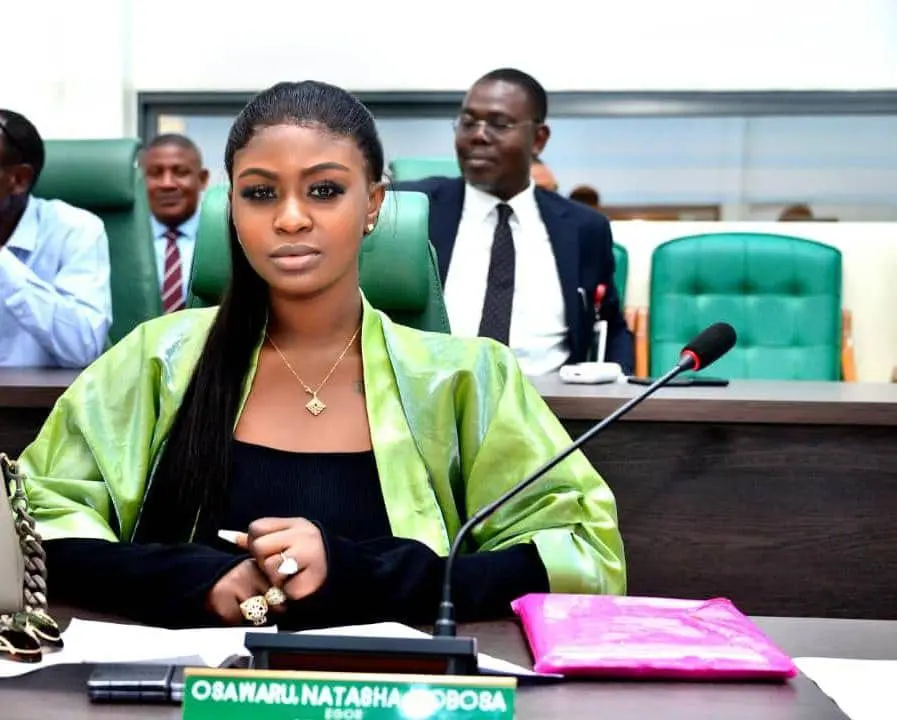
Blessing Agbebaku and Maria Edeko on Monday retained their positions as the Speaker and the Deputy Speaker of the Edo State of Assembly after a minor leadership shuffle.
Ekwutosblog reports that the duo who are members of the Peoples Democratic Party, PDP, retained their positions following the implementation of a letter sent to the House by the state leadership of the All Progressives Congress, APC.
Agbebaku who read the letter addressed to him by the acting state chairman of APC, Jarret Tenebe, however, announced a minor change in the principal officers of the House.
Charity Aiguobarueghian, PDP, Ovia North-East I, Natasha Osawaru Irobosa, PDP, Egor, and Yekini Idaiye, PDP, Akoko-Edo I, were removed as the Majority Leader, Deputy Leader and Chief Whip of the House, respectively.
Natasha Osawuru is the lover of singer Tuface.
The trio were replaced with Ibhamawu Jonathan Aigbokhan, APC, Esan West as Majority Leader, Addeh Emakhu Isibor, APC, Esan North-East I, and Lecky Hussein Mustapha, APC, Etsako West I as Deputy Leader and Chief Whip of the House, respectively.
The position of the Deputy Chief Whip earlier given to Richard Edosa, Oredo West constituency, was eventually cancelled as there was no such position in the legislature.
The letter dated April 7, 2025, titled ‘Nomination of Principal Officers of the Edo State House of Assembly’, was signed by Tenebe, state acting chairman of APC and Lawrence Okah, the secretary.
Parts of the letter read: “We write to refer you to our earlier correspondence dated 14th March, 2025 to your office notifying you of the majority status of our party, the All Progressives Congress, APC, in the Edo State House of Assembly.
“Consequently, we hereby forward to you the party’s nomination of principal officers’ position in the House.
“Majority Leader, Hon Ibhamawu Jonathan Aigbokhan, Esan West constituency, Deputy Majority Leader, Hon Emakhu Addeh Isibor, Esan North-East I, and Chief Whip, Hon Lecky Hussein Mustapha, Etsako West constituency.”
The majority leader and deputy majority leader are from Edo Central Senatorial District while the Chief Whip, Lecky Hussein Mustapha, is from Edo North Senatorial District.
Recall that Richard Edosa was the only lawmaker elected on the platform of the Labour Party but he recently defected to the APC.
The Speaker, Agbebaku disclosed that the PDP would also bring its list of nominees of principal officers to the House.
He noted that his position as the Speaker and that of the Deputy Speaker were not guaranteed in the ongoing leadership change in the House.
Politics
NEC Meeting: No vacancy in LP leadership – Abure warns Peter Obi, Otti
Published
1 day agoon
April 7, 2025By
Ekwutos Blog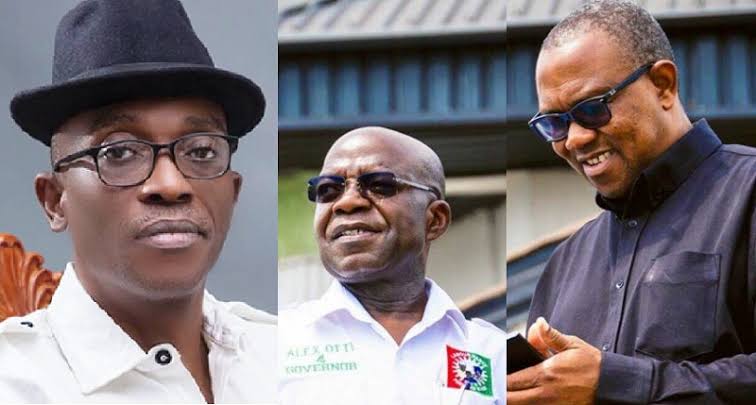
The National Chairman of the Labour Party, Julius Abure on Monday warned there is no vacuum in the party’s leadership.
Abure issued the warning ahead of the party’s National Executive Committee, NEC, meeting called by LP’s former presidential candidate, Peter Obi and Governor Alex Otti of Abia State.
Speaking at a public conference at the party secretariat, Abure described Obi and Otti as betrayals.
He noted that the Supreme Court was clear in its judgment, stressing that LP matters are internal affairs of political platforms.
According to Abure: “Tell them that there is no vacancy in our party. In the Labour Party, we don’t betray our candidates even though some betray us after giving them tickets.
“We also want to urge those who have been deceived by last week’s misleading interpretation of the Supreme Court judgment to disregard the speculation. I remain the National Chairman of the Labour Party.
“Again, the Labour Party Constitution does not recognise the setting up of a caretaker committee for party affairs.”
Ekwutosblog had reported that Obi and Otti had called for a NEC meeting scheduled to hold on Wednesday in Abuja.
The duo said the meeting would be followed by a town hall engagement with major stakeholders at the Transcorp Hilton in Abuja.

US tariffs won’t have much effect on Nigeria – FG

Wike hosts suspended Rivers lawmakers in UK

Pascal Dozie, Founder Of Diamond Bank Passes Away At 85
Trending

 Trending6 months ago
Trending6 months agoNYA demands release of ‘abducted’ Imo chairman, preaches good governance
- Business6 months ago
US court acquits Air Peace boss, slams Mayfield $4000 fine

 Politics6 months ago
Politics6 months agoMexico’s new president causes concern just weeks before the US elections
- Entertainment6 months ago
Bobrisky transferred from Immigration to FCID, spends night behind bars
- Entertainment6 months ago
Bobrisky falls ill in police custody, rushed to hospital

 Politics6 months ago
Politics6 months agoRussia bans imports of agro-products from Kazakhstan after refusal to join BRICS

 Politics6 months ago
Politics6 months agoPutin invites 20 world leaders
- Politics1 year ago
Nigerian Senate passes Bill seeking the establishment of the South East Development Commission.

